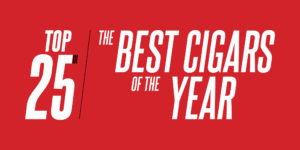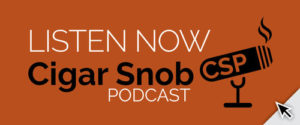Q&A with Nestor Andrés Plasencia
We met Nestor Andrés Plasencia at his factory cigar lounge in Estelí Nicaragua for a conversation about his hometown, tobacco trends, and why cigars are deeper than business for the Plasencia family.
Interview by Erik Calviño and Nicolás A. Jiménez
NJ: What should we call this room we’re in?
NP: The Plasencia lounge within the Plasencia cigar factory, which is the most beautiful cigar factory in the world.
EC: It’s a small factory, but it feels like you’re walking into someone’s home and it’s got a courtyard in the middle like an old Spanish home. I’ve always been a fan of this fábrica.
NP: And the thing is that we want our people to feel comfortable. They have great working conditions. I think they can express it in their part of the product that they’re making.
EC: When I [first came] here, I remember that one of the things that jumped out at me was how clean everything was because making cigars is not a clean process.
NP: We learned that from my dad. He said, “We have to show respect for our work and the people, if we show the respect that we have for the place, people will feel respect for the work that they’re doing.” And that was a lesson that I learned at a very early age from my dad.
NJ: The mentions of your dad are a good segue. Give us the abridged version of who your family is and your history in tobacco.
NP: My pleasure. I always approach these [interviews] as a chance to tell the beautiful story of the Plasencia family. It’s a love story about the family and tobacco [that spans] 154 years. My great grandfather’s uncle went from the Canary Islands to Cuba in 1865 and started growing tobacco that year. Then my great grandfather went from the Canary Islands and started working with his uncle, then he bought a farm. He made the farm a little bigger, then my grandfather came, worked with his dad and his brothers. In 1965, my dad came [to Nicaragua] and started working the farms and fields. So a hundred years after the family arrived in Cuba, my father came to Nicaragua because of the Cuban revolution. We’re very blessed to be born in this beautiful family and this beautiful industry. We grow tobacco for many people in the industry and we make cigars for many people in the industry. We’re blessed that the people trust their brands to us and we want to do the best job. And also we’re working with the Plasencia line. We started doing it most heavily about three years ago when we launched the Plasencia Alma Fuerte.
NJ: Cigar smokers may have seen that difference — where, almost overnight there was this new player that was not new. “Plasencia” was a name that was very familiar to some, but often only vaguely. What spurred the decision to change gears like that for the family and the company?
NP: I have no words to express the passion that we have for this beautiful industry. Seeing my dad and what he’s accomplished. My grandfather, all the hard work that they did. We’ve grown tobacco for 154 years. Listen to this: without skipping any crop. Despite revolutions, blue mold, we never missed a crop. So that’s the passion that we have for this beautiful industry. And I say we have to tell this story. Not because of an ego thing, but because of the resilience that my family has, especially my dad and my grandfather. They moved all their family, with nothing in their pockets, to start all over again in a different country. Man, that’s amazing. I don’t have that experience. I said, “What’s the challenge that we have?” As the fifth generation in this industry, the challenge that we have is to tell the story of these amazing people and what they have achieved despite any circumstances. When you have a goal in mind, no matter what you’re going to accomplish it.
So that was one of the main reasons. The other reason is we were and we are vertically integrated. We grow the tobacco, we ferment the tobacco, we select the tobacco, we age the tobacco, we make the cigars. But we’re missing the most important part, which is the connection with the final consumer. Why do we do all this stuff? I truly believe that we make people’s lives better with cigars. So imagine that you can say that with your name on a product. That’s an amazing blessing.
NJ: What was the itch like before you launched these brands? Was there this feeling of anxiousness? You’re doing all this work and then other people’s names end up on all the products.
NP: That’s fine because it’s a wonderful relationship we have with all these guys. But you know, it’s not the same. In 2019, I went to the UK, France, Switzerland, Germany. And I went to cigar shops and I saw this cigar that we make. I was a witness of the tobacco being in the fields. It’s easy to say, but if you start thinking about it…
I’m a farmer, man. I spend a lot of time here in the factories. So I witness this tobacco being planted, being harvested. I was a witness to the tobacco in the fermentation process. In the aging process. I was a witness when the cigar was being made. And then I go to all these places in the United States, New York, Atlanta, Florida, Texas, and I see that. What a sense of…
NJ: It’s like you finally invited yourself to your own party.
NP: That’s a good way to say it. It’s a great feeling. We just had a holiday in Mexico with all the family. My father, my mother and my brothers, their partners and everybody. We went to Guadalajara and stopped by a cigar shop and the guys there were so happy. They had Plasencia cigars in their lounge. One guy told me “When my kid was baptized, we celebrated with Plasencia Alma Fuerte.” Imagine that. People are celebrating their most important moments with a product that you’re making. It gives me goosebumps, man.
NJ: Speaking of Alma Fuerte, that’s what the two of you are smoking right now. It was our 2017 Cigar of the Year.
NP: We’re so blessed and so grateful to you guys for that ranking. That put us on the map since day one. That was the same year that we launched the product on the market and we came with the number one cigar.
EC: You still smoke the cigar right now and it’s like, “Damn, this is good.”
NP: It’s an amazing feeling because we were preparing for this moment. The family talked and said, “If we’re going to do it, we’re going to do it right. We’re gonna do it to the best of our abilities.”
EC: And you came out with a cigar that was expensive right out of the gate… To come out of the gate with a $22 cigar. I remember people saying “I think these guys are nuts with that price point. Who the hell is going to buy a $22 cigar if you’ve never heard of it?”
But all you had to do was smoke it. And it was a home run from the second it hit the shelf. A well-deserved number one. Hands down. There was no question about it.
NJ: You wanted to talk about all the people who make the cigars possible. In this case, it’s a lot of people because of how much growing Plasencia does. Talk a bit about that work and the people who do it.
NP: It’s a lot of work. We toured some farms in Honduras this morning and I said, “The tobacco seed is so tiny that in one gram of weight, you have 10,000 seeds. Imagine that. That energy that this little seed has in 50 days is going to be the size of a small bottle of water. But then you transplant that plant into the final field and in another 55 days it’s gonna be ready for harvest.” It’s so amazing seeing the plant growing. And then all the little details that you have to see to, the amount of fertilization that you have to add to that plant. You have to know the soil. My father said, “Tobacco talks to you. You just need to learn tobacco language. Knowing when that leaf is going to be ready to be harvested. Knowing how much time that tobacco has to be in the curing barn in order to change from green to yellow to brownish, and then you have to take that leaf to the fermentation process. There are so many steps, but if you have motivated, passionate people … That’s why I always give credit to the people because we can’t do this by ourselves.
EC: It’s an army of people.
NP: In the growing season, we’re almost 9,000 people total between Honduras and Nicaragua. We grow 3,100 acres of tobacco. Our last crop was 5.5 million pounds of tobacco. But in order to do it right, you have to have the right people in place. The managers, the people in the fields, the people in the factories.
I’m a big Tony Robbins follower. I went to a business seminar he has. He said you have to see what your X factor is in your business. What is your differentiator? I was thinking about it and I said, “Our biggest differentiator is our people. We invest in our people.” We hired Tony Robbins coaches for our guys over here so they know how to run logistics, customer service. You can be innovative, not just in product. You can be innovative in every aspect of your business. If you have a good product, if you sell a good product, the customer’s going to have a great experience and they’re going to keep buying it. The retail shop’s going to have better margins. We’re going to have better margins. A business where everybody wins is a business that will be sustainable for many, many years. And that’s why we have been in the industry for 154 years.
NJ: People might be struck by the acreage you described a moment ago. And then the fact that early in this discussion, Erik mentioned this is a small factory. So there’s this sort of duality there. Talk a bit about what that factory side of your operation looks like.
NP: We have four factories, two factories in Honduras and two factories in Nicaragua. In this factory specifically, we make all the the most premium lines. We are talking about some Alec Bradley products, Nat Sherman products, Montecristos, Romeos, Buenaventuras, Crux. And all the Plasencia lines except Cosecha 146, which is made in one of our Honduran factories. So we separate the factories depending on the product that we’re making.
NJ: What’s it look like for somebody who’s getting in at the ground level and then move up the ranks at Plasencia?
NP: It depends on the person. There’s never a timeline where you say you have to do this for many, many years. It depends on you and your willingness to work. For example, our quality control manager here has been with us 22 years in this factory and he started making cigars. The girl in charge of logistics has been with us for 15 years and she started packaging cigars. When I see those success stories, that’s…
EC: You know, earlier you said we’re not changing people’s lives, but rather making them better, but you are also changing people’s lives.
NP: Oh yeah. For people over here we’re changing people’s lives. Something I’m very proud of is the daycare centers that we have for the children of the workers. This year, we’re going to have 300 kids in daycare centers where we supply Montessori style education. So it’s a first-world quality education in a third-world country. The only way that the people can succeed is through education. So we supply that. It’s a beautiful thing. So everything that we do has a bigger meaning for our people.
NJ: We talked before we started the interview about all the changes that Estelí has been through. Talk a bit about that from your perspective.
NP: I was born here in Estelí. I think I’m the only guy from Estelí who is in the cigar industry as a brand owner. For me it’s an amazing sense of happiness when I see the development of my own city. When I see the roads are better, when I see better opportunities for the people that were born in the city, it’s great. I think it’s the best time in history for cigar lovers right now. The quality of the cigars that every manufacturer is making is amazing. That brings wealth, that brings growth, that brings better conditions to the people. People are able to send their kids to school and everything. For me it’s this great sense of happiness when I see that, especially in my own town.
EC: It’s been two years since I’ve been here in Esteli, which is the longest stretch that I have ever gone without coming to Estelí. I’ve seen it grow, but I typically will come multiple times a year and so I see the growth in slow, small increments. But in this span of two years, which has not been an easy time for Nicaragua… when we arrived I kept seeing signs and I was like, “Okay, that’s new. That’s new. That wasn’t here last time, that wasn’t here last time.”
NP: I’m seeing it every day. It’s striking. And there’s more investment. We just bought another farm in Jalapa. And it’s safe here. My family’s here, my kids are here. If you saw that people were fleeing the country and stuff like that, then you’d have to then you have to be worried. But it’s the opposite. I brought my team from the United States. If it were dangerous, I wouldn’t do it.
NJ: We’d be remiss if we didn’t talk about your cigar portfolio. We mentioned that the two of you are smoking Alma Fuerte. I’m smoking Alma Del Fuego, which is newer …
NP: That was the line that we launched [in 2019]. It’s another hundred-percent Nicaraguan cigar and we are very happy with the reception as well. We also have Plasencia Alma del Campo that we launched two years ago. All the cigars that have the Plasencia brand, are 100 percent tobacco we grow ourselves. We want to control everything in all the cigars that have the Plasencia band on them. So we have those, we have the Plasencia Reserva Original as well, which is the only organic cigar in the world. That’s my baby. When I came out of university, I learned how to grow some vegetables organically. So I started experimenting with organic growing. Your biggest asset besides your people is the field. So more organic material and more good things for the soil means better tobacco. And then we have the Plasencia Cosecha 146 that is a blend of Nicaraguan and Honduran tobacco that we grow. That cigar is made in Honduras.
NJ: Thanks for having us! Anything you’d like to add here?
I just want to thank you guys and thank your readers for enjoying this beautiful industry. Bring in friends, family members and expose them to this beautiful experience. You are not gonna regret it. You’re gonna make people’s lives better.
Listen to the full interview with Nestor Andrés Plasencia on the Cigar Snob Podcast (available at cigarsnobmag.com/podcast or wherever you listen to podcasts).




